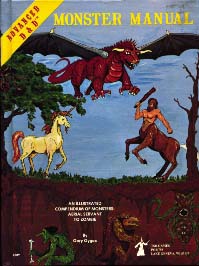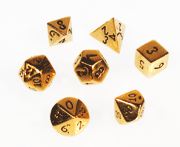 You can only cram so many things into your life, and one that has been left out of my personal solution to the time-managment knapsack problem is traditional, pen-and-paper role-playing. I was a heavy gamer since first laying hands on a first-edition Monster Manual in third grade, continuing through high-school and college: lots of GURPS and D&D, but also Ars Magica, Call of Cthulhu, and plenty of others. After I graduated, the gaming group dispersed to the winds, and since then I haven’t played more than the occasional pick-up game.
You can only cram so many things into your life, and one that has been left out of my personal solution to the time-managment knapsack problem is traditional, pen-and-paper role-playing. I was a heavy gamer since first laying hands on a first-edition Monster Manual in third grade, continuing through high-school and college: lots of GURPS and D&D, but also Ars Magica, Call of Cthulhu, and plenty of others. After I graduated, the gaming group dispersed to the winds, and since then I haven’t played more than the occasional pick-up game.
A few years ago, just before I decided to go back to grad school, I decided that it had been too long since I had gamed. Against my naturally introverted tendencies, I posted a notice in a local game shop. Within two weeks, I had a response: a few people were trying to start up a game of third-edition Dungeons and Dragons. Several of us had not played this version before, so we spent most of the first meeting reading rulebooks and taking advice from the resident munchkin on character design.
No stranger to munchkinism myself, I rolled up a dwarven ranger (with terrible ranged weapons skills), and went heavily for animal training. I purchased several war dogs out of my initial gold; I had scoped out the Dungeon Master, and figured that he wouldn’t enforce the rules on how much control I’d have over the dogs’ actions.
At the second meeting, the game is finally underway. We start off outside a town . . . and no one wants to go in. The DM is peeved, as this means he can’t get his planned adventure hook into our characters. I’ll spare you the details, but two hours later we have a mission, and are off into the woods. At last, some action! The DM calls for an ability check; six dice rolls, and nobody manages to detect the goblins lurking in the trees. The ambush begins with a painful peppering of arrows. We then fight the goblins for the next four bloody hours of real time, including a break to go to the local market for munchies.
It’s now six hours since the gaming session started. One our our characters has died, the rest are badly wounded, one of my dogs is dead, and I’ve spent hours of my life contending with what is essentially a random encounter. What was it I missed about role-playing, exactly? Needless to say, that game was not compelling enough to bring me back for session after session.
Since leaving college, I no longer have endless swaths of “hang-out” time. I have a life, and a house, and a spouse, and work, and then grad school on top, along with a slew of interests that I’m trying to pursue. I could manage gaming if it were my only hobby . . . but eight hours of aimless sitting around rolling dice to kill a few tactically uninteresting goblins just doesn’t cut it anymore.
There’s a great article from Pyramid Online, published November 17, 2000, “How to Keep Gaming after Adulthood: or, Everything I Needed to Know about GMing I Learned from Watching Television.” (Pyramid subscription required to access the article. There are a few discussions about it various places about the net.) The author, David Dickerson, makes exactly this point: busy people need a different kind of game.
The article makes a number of suggestions for playing RPGs with adults:
Keep things contained. Don’t try to run a game with too many players. Don’t aim for grand epics; episodic or one-shot stories are easier to sustain. More than three or four hours for a gaming session is probably too much.
Stay flexible. When planning an adventure, make sure it the game can proceed if someone can’t make it. Avoid games with complex rulesets; keep things fast and loose. Focus on the action.
Use TV as a model. Genre TV shows have an ideal structure for this sort of game. Have an A-plot (usually violence) and a B-plot (perhaps sex). Make sure every character has a chance to experience some sort of conflict or challenge, tailored to their personal gaming style. Establish a pattern for the game for a few sessions, an then violate the players expectations. Make the fight scenes different and dramatic: go beyond the goblin-slaying dice-fest. Design a big, set-piece combat with a twist.
Keep players involved outside the game. Set up an email discussion list or web site to handle less-exciting stuff (such as dishing out experience) . Send out news and rumors of events in the game world.
Try this rough mixture for a session: One NPC encounter; one short combat; one major, set-piece combat. Allow time for discussion and making plans.
Have I tried this? Nope. I am likely to remained isolated from gaming for the forseeable future. Still, I enjoy reading RPG rulebooks, browsing in game stores, and reading about new game designs on The Forge. I’m keeping my hand in. Someday, this adult shall game again.
(Monster Manual cover scan is courtesy of Wikipedia.)

 You can only cram so many things into your life, and one that has been left out of my personal solution to the time-managment
You can only cram so many things into your life, and one that has been left out of my personal solution to the time-managment 